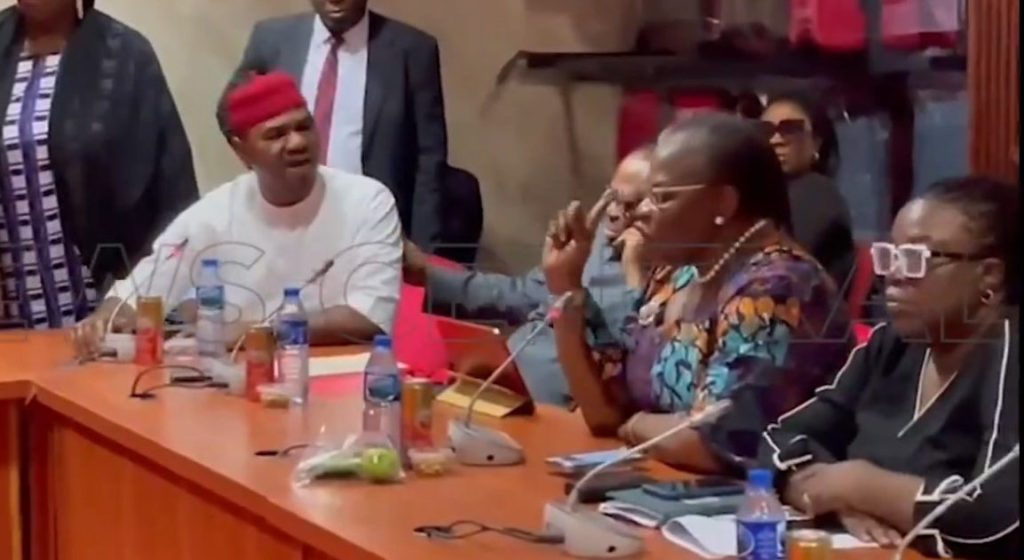A tempestuous clash erupted during a Nigerian Senate hearing on Tuesday, highlighting the tension between established procedures and the pursuit of justice. The hearing, convened by the Senate Committee on Ethics, Privileges, and Public Petitions, was meant to address a fresh petition submitted by Natasha Akpoti-Uduaghan, a suspended senator from Kogi Central. However, the proceedings quickly devolved into a heated exchange between Senator Onyekachi Nwaebonyi, representing Ebonyi North, and former Minister of Education, Oby Ezekwesili, who was present in support of the petitioner. The contentious atmosphere underscored the petitioner’s concerns regarding perceived bias within the committee and raised critical questions about the balance between Senate rules and constitutional rights.
The spark that ignited the confrontation came from Zubairu Yakubu, the chief petitioner from Kogi Central, who openly questioned the impartiality of the committee chairman, Neda Imasuen. Yakubu expressed reservations about Imasuen’s previous public statements concerning a separate allegation of sexual harassment against Senator Godswill Akpabio, suggesting that the chairman had already formed an opinion before hearing the current petition. He further alleged that some committee members held pre-existing relationships with Akpabio, potentially compromising their neutrality. These pointed accusations ignited a backlash from some lawmakers who felt Yakubu was impugning the credibility of the committee. The tension further escalated when Ezekwesili, present in a supportive capacity, insisted on being recognized and sworn in as a witness, asserting her right as a Nigerian citizen. This assertion prompted a particularly caustic response from Senator Nwaebonyi, who verbally attacked Ezekwesili, escalating the situation into a full-blown altercation that momentarily disrupted the hearing.
The core issue at the heart of this clash revolved around the petitioner’s lack of confidence in the committee’s ability to conduct an unbiased hearing. The petitioner’s concerns, articulated through Yakubu’s request for the chairman’s recusal and underscored by Ezekwesili’s insistence on participating as a witness, highlighted the perceived conflict of interest arising from the chairman’s prior public pronouncements and alleged connections between committee members and the subject of a related investigation. This apprehension touched upon a fundamental principle of justice: the right to a fair hearing before an impartial tribunal. The heated exchange that followed, particularly Nwaebonyi’s outburst against Ezekwesili, further exacerbated the situation, shifting the focus from the substantive issues of the petition to the conduct of the senators themselves.
Following the contentious exchange, Senator Patrick Ndubueze, representing Imo West, intervened, appealing for calm and reminding those present of the decorum expected within the Senate chamber. While acknowledging the right of citizens to participate, Ndubueze emphasized the Senate’s established rules and procedures, stressing the need for recognition before addressing the committee. This intervention attempted to restore order and refocus the proceedings on the established protocols of the Senate. However, the underlying tension remained, with the petitioner’s fundamental concerns about impartiality still unresolved. Ultimately, Chairman Imasuen adjourned the hearing indefinitely, citing the ongoing court case involving both Akpoti-Uduaghan and Akpabio’s wife, as well as the absence of Senator Akpoti-Uduaghan herself. This decision, while seemingly procedural, effectively postponed addressing the core issues raised by the petitioners.
In the aftermath of the adjourned hearing, Ezekwesili addressed journalists, expressing her strong disapproval of the Senate’s handling of the situation. She characterized the committee’s actions as a blatant disregard for the Nigerian Constitution, accusing the Senate of prioritizing internal rules over constitutional provisions, especially in matters of disciplinary action and petitions. Ezekwesili argued that this subordination of constitutional rights to Senate rules sets a dangerous precedent, potentially enabling those in positions of power to manipulate procedures to stifle dissent and obstruct justice. She highlighted the suspension of Senator Akpoti-Uduaghan as a previous instance of this perceived overreach, arguing that the Senate had similarly prioritized internal rules over constitutional guarantees in that case.
Ezekwesili’s critique focused on the perceived imbalance between Senate rules and the constitutional rights of citizens. She argued that the Senate’s insistence on adhering to internal procedures, even when those procedures seemingly conflicted with constitutional provisions, undermined the principles of fairness and due process. Her call for an independent review of the matter stemmed from the belief that the Senate committee, as currently constituted, could not provide an impartial hearing due to perceived biases. This concern, echoing the initial reservations voiced by the petitioner, underscored the central question of whether the Senate’s internal processes were being used to circumvent constitutional rights and obstruct the pursuit of justice. This incident, therefore, transcended a mere procedural dispute, highlighting a fundamental tension within the Nigerian political system – the potential conflict between institutional rules and the constitutional rights of citizens.
Ezekwesili’s concluding remarks served as a stark warning against the dangers of allowing internal rules to supersede constitutional principles. She argued that such practices risk eroding the foundations of democracy by empowering those in positions of authority to manipulate procedures for their own benefit, silencing opposition and obstructing the pursuit of justice. Her criticism highlighted the need for a careful balance between institutional procedures and the fundamental rights guaranteed by the constitution, emphasizing that a healthy democracy requires a vigilant defense of constitutional principles against potential encroachment by internal rules and regulations. This incident serves as a reminder that the pursuit of justice requires not only adherence to established procedures but also a steadfast commitment to the principles of fairness, impartiality, and respect for constitutional rights.














